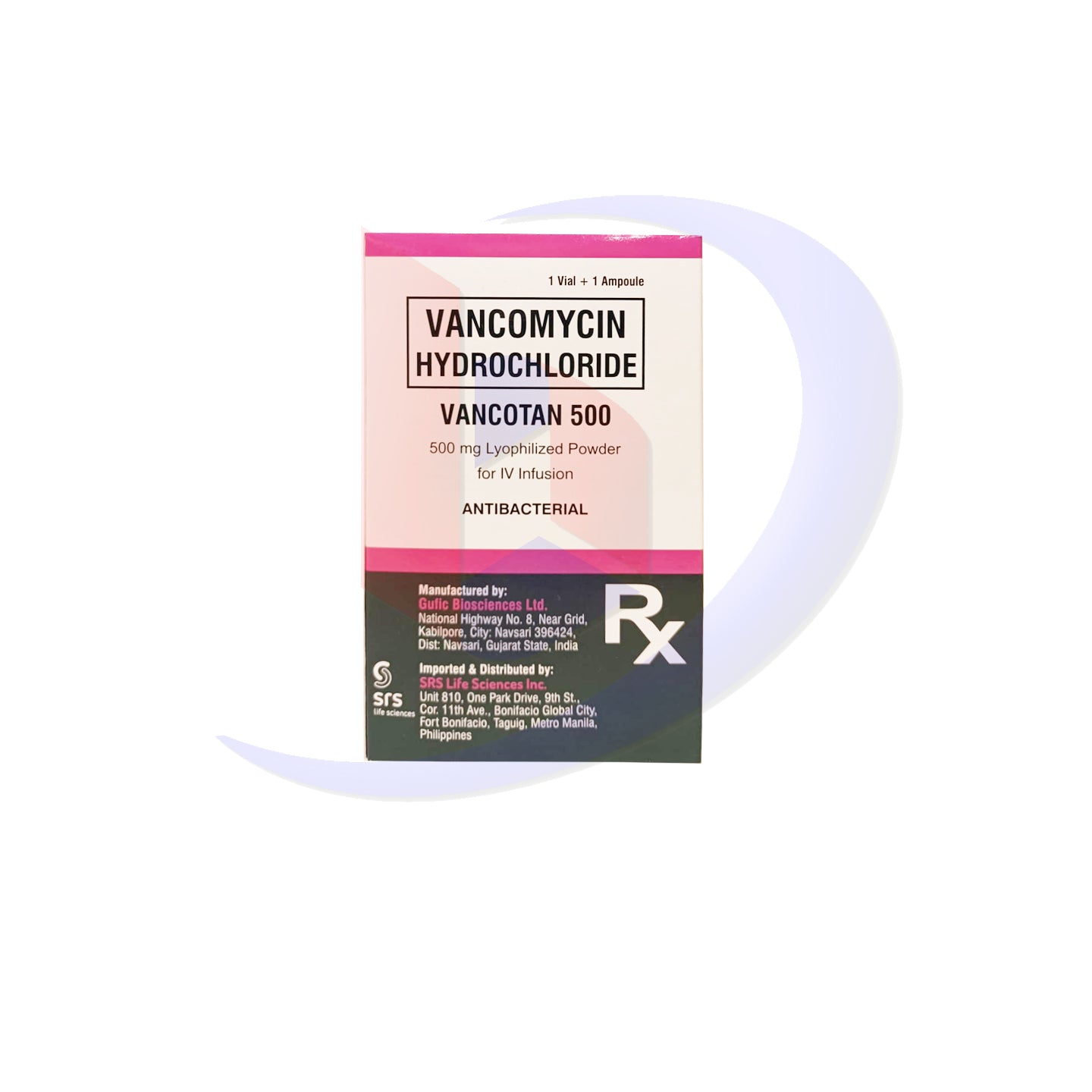Bambang Pharmaceutical Depot Inc.
Vancomycin Hydrochloride (Vancotan 500) 500mg Lyophilized Powder for IV Infusion Antibacterial 1 Vial + 1 Ampoule
Vancomycin Hydrochloride (Vancotan 500) 500mg Lyophilized Powder for IV Infusion Antibacterial 1 Vial + 1 Ampoule
Couldn't load pickup availability
Here’s a comprehensive overview of Vancomycin Hydrochloride (Vancotan 500) 500mg Lyophilized Powder for IV Infusion:
Product Description:
Vancomycin Hydrochloride (Vancotan 500) is an antibiotic medication that comes in the form of 500mg lyophilized powder for intravenous (IV) infusion. The product includes 1 vial of powder and 1 ampoule of solvent, which is used to reconstitute the powder for infusion. Vancomycin is a glycopeptide antibiotic that is used to treat serious bacterial infections caused by Gram-positive organisms, particularly those that are resistant to other antibiotics, such as methicillin-resistant Staphylococcus aureus (MRSA).
Vancomycin is known for its ability to target and inhibit bacterial cell wall synthesis, which leads to the destruction of the bacteria. It is typically administered in a hospital setting under the supervision of healthcare professionals due to the potential for serious side effects, including nephrotoxicity and ototoxicity.
Indications:
Vancomycin Hydrochloride (Vancotan 500) is indicated for:
-
Severe Gram-positive bacterial infections: Used to treat infections caused by Gram-positive bacteria, including methicillin-resistant Staphylococcus aureus (MRSA), Streptococcus pneumoniae, and Enterococcus species.
-
Serious infections: It is used in cases of life-threatening infections like bacteremia, endocarditis, osteomyelitis, and meningitis caused by susceptible organisms.
-
Hospital-associated infections: Often used in the treatment of nosocomial infections that are resistant to other antibiotics.
-
Clostridium difficile-associated diarrhea: Vancomycin may also be used orally (in a different formulation) to treat infections of the gut caused by Clostridium difficile.
-
Prophylaxis in high-risk surgeries: It may be used to prevent infection in certain high-risk surgical procedures, especially in patients allergic to penicillin or those with penicillin-resistant infections.
Dosages (Usage Instructions):
The dosage of Vancomycin Hydrochloride (Vancotan 500) depends on the type of infection, the patient's weight, renal function, and overall clinical condition. Below are general dosage guidelines:
-
General Adult Dosage:
-
For serious infections: The usual dose for adults is 1 gram every 12 hours, administered intravenously.
-
For severe infections (e.g., MRSA): The dose may increase to 15 mg/kg every 8–12 hours depending on the severity of the infection and the patient's renal function.
-
For Clostridium difficile (oral administration): A different formulation of vancomycin is used orally, with usual doses ranging from 125 mg to 500 mg 4 times daily for 10-14 days.
-
-
Renal Adjustment: In patients with renal impairment, the dosing frequency or dose may be adjusted depending on the degree of renal dysfunction, as Vancomycin is primarily excreted by the kidneys.
-
Reconstitution and Administration:
-
Reconstitution: To prepare the IV solution, add the appropriate amount of sterile water or saline (usually indicated on the packaging) to the vial containing the lyophilized powder. Mix gently to dissolve the powder.
-
Infusion: The reconstituted solution is administered intravenously over a period of 1 to 2 hours to minimize the risk of side effects like "Red Man Syndrome," which can occur with rapid infusion.
-
Monitoring: During IV administration, the patient should be monitored for potential side effects, particularly renal function and serum drug levels.
-
Side Effects:
Common and serious side effects associated with Vancomycin Hydrochloride (Vancotan 500) include:
-
Red Man Syndrome: This is a common reaction to rapid infusion of Vancomycin. It is characterized by a flushing rash, itching, and sometimes hypotension. Slowing the rate of infusion can help alleviate this condition.
-
Nephrotoxicity (kidney damage): Vancomycin can cause kidney toxicity, especially when given in high doses or in patients with pre-existing kidney conditions. Kidney function should be monitored during treatment.
-
Ototoxicity (hearing loss): Prolonged use or high doses can affect hearing, leading to tinnitus or even permanent hearing loss in some cases.
-
Phlebitis and vein irritation: Intravenous infusion can cause irritation at the injection site, sometimes leading to inflammation or pain at the infusion site.
-
Allergic reactions: As with most antibiotics, there is a risk of allergic reactions, including skin rashes, swelling, or more severe reactions like anaphylaxis.
-
Gastrointestinal issues: Though rare, nausea, vomiting, and abdominal pain may occur.
-
Blood disorders: Rarely, Vancomycin may cause low white blood cell count (leukopenia), low platelet count (thrombocytopenia), or anemia.
-
Hematologic Toxicity: Rare cases of bone marrow suppression can occur, leading to a decrease in red and white blood cell counts.
Contraindications:
Vancomycin Hydrochloride (Vancotan 500) should be avoided or used with caution in the following situations:
-
Allergy or Hypersensitivity: Known hypersensitivity to vancomycin or any of its components is a contraindication. Severe allergic reactions, including anaphylaxis, have been reported in some cases.
-
Renal Impairment: Use with caution in patients with pre-existing kidney disease, as Vancomycin is primarily excreted via the kidneys. Renal function should be monitored, and dose adjustments may be necessary.
-
Hearing Impairment: Vancomycin should be used with caution in patients with pre-existing hearing impairment, as it can cause ototoxicity, especially when administered in high doses or with other ototoxic drugs.
-
Severe Gastrointestinal Disorders: In patients with severe gastrointestinal disorders, particularly if there is a history of Clostridium difficile-associated colitis, caution should be exercised, although this is not a common contraindication.
-
Concurrent Use with Nephrotoxic Drugs: When used alongside other nephrotoxic medications (e.g., aminoglycosides), Vancomycin may exacerbate the risk of kidney damage. It’s important to monitor renal function closely when these drugs are used together.
Conclusion:
Vancomycin Hydrochloride (Vancotan 500) is an effective IV antibiotic used to treat severe bacterial infections, particularly those caused by Gram-positive organisms like MRSA. It is a potent and critical drug in managing infections that do not respond to other antibiotics, but it requires careful monitoring due to the potential for serious side effects, such as kidney damage, hearing loss, and red man syndrome. Proper administration, including controlled infusion rates and renal function monitoring, is essential to ensure safety and effectiveness. Always follow the prescribing guidelines and consult a healthcare provider for appropriate dosing and use.
Share

Product Features
Highlights
Details
Lot #
Expiry Date
"For All Your Pharma And Medical Supply Needs"
-
MEDICINES
We offer large range of generics and branded tablets, capsules, topicals, suppositories, drops or suspensions, inhalers and injections.
-
SUPPLEMENTS
High quality yet very affordable vitamins and minerals, specialty supplements, herbals and botanicals, sports nutrition, and weight management.
-
MEDICAL SUPPLIES
We serve all types of medical supplies needed in clinics, laboratories, and hospitals like cottons, gauze, alcohol, swabs, gloves, bandages, lancets, glucometer, etc.
-
MEDICAL EQUIPMENT
We also serve durable and affordable medical devices and equipment needed in clinics, laboratories and hospitals.
Subscribe to our emails
Be the first to know about new collections and exclusive offers of Bambang Pharmaceutical Depot Inc.


